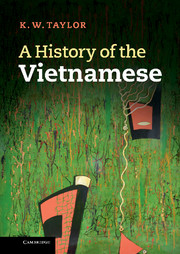Book contents
- Frontmatter
- Contents
- List of Figures
- List of Tables
- List of Maps
- Acknowledgements
- Introduction
- 1 The provincial era
- 2 The Ly dynasty
- 3 The Tran dynasty
- 4 The Le dynasty
- 5 The beginning of inter-regional warfare
- 6 The Fifty Years War
- 7 The south and the north diverge
- 8 The Thirty Years War
- 9 The Nguyen dynasty
- 10 The French conquest
- 11 Franco-Vietnamese colonial relations
- 12 Indochina at war
- 13 From two countries to one
- Retrospective
- Bibliographic essay
- Figures
- Tables
- Maps
- Index
5 - The beginning of inter-regional warfare
Published online by Cambridge University Press: 05 May 2013
- Frontmatter
- Contents
- List of Figures
- List of Tables
- List of Maps
- Acknowledgements
- Introduction
- 1 The provincial era
- 2 The Ly dynasty
- 3 The Tran dynasty
- 4 The Le dynasty
- 5 The beginning of inter-regional warfare
- 6 The Fifty Years War
- 7 The south and the north diverge
- 8 The Thirty Years War
- 9 The Nguyen dynasty
- 10 The French conquest
- 11 Franco-Vietnamese colonial relations
- 12 Indochina at war
- 13 From two countries to one
- Retrospective
- Bibliographic essay
- Figures
- Tables
- Maps
- Index
Summary
Return of adolescent kings and great lords
Le Tranh had six sons. The eldest, although reported to have been intelligent and well educated, was so obstinate that while still small he poisoned his mother because she opposed his will. But what most disqualified him to be king was that he liked to wear women’s clothing. The second and third sons were born only seventy-five days apart in 1488. In 1499, Le Tranh had designated the third son, Le Thuan, as crown prince. He reportedly passed over the second son, Le Tuan, because he was “immature, without moral goodness, incompetent, and unworthy.” While the younger three sons and members of their entourages appear to have played roles in later intrigues, no further specific information about them has been recorded. Le Thuan’s mother, a royal concubine, had died when he was small. His paternal grandmother, the Truong Lac queen mother, was his adoptive mother.
Objections to Le Tuan being named crown prince were about more than his personal qualities. His mother had begun as a poor peasant across the river from Dong Kinh. Destitute, she had sold herself into slavery. When her owner was arrested for some unrecorded offense, she was confiscated and became the property of an official who brought her into royal service where she became a servant of Le Tranh’s mother. Le Tranh took her as a concubine. She died shortly after giving birth to Le Tuan. Another royal concubine named Nguyen Kinh raised the motherless boy and attached her aspirations to the prospect of him becoming king. Nguyen Kinh and members of Le Tuan’s mother’s family were disappointed when he was not named crown prince. However, this did not put an end to their hopes.
- Type
- Chapter
- Information
- A History of the Vietnamese , pp. 224 - 257Publisher: Cambridge University PressPrint publication year: 2013



